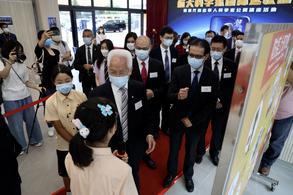 Students welcome Long Lehao, chief designer of the Long March rocket series, upon his arrival at Pui Kiu College in Shatin, Hong Kong, June 25, 2021. (EDMOND TANG / CHINA DAILY)
Students welcome Long Lehao, chief designer of the Long March rocket series, upon his arrival at Pui Kiu College in Shatin, Hong Kong, June 25, 2021. (EDMOND TANG / CHINA DAILY)
HONG KONG - In addition to esoteric scientific knowledge and touching spirits of spaceflight, the fun within conversations was captured between the nation’s top scientists and Hong Kong young students.
Here are some trivia from the five-day visit of a delegation of six of China's top aerospace engineers and designers to the special administrative region this week. They delivered hours-long lectures at two universities and six secondary schools and held face-to-face talks with thousands of Hong Kong students.
Conversation 1:
"What's the view in outer space? Can astronauts look directly into the sun?"
"I think they can always put on sunglasses when they look at the sun. I haven't been to outer space. Maybe, in the future, you could be the one who tells me how the view is up there when you become an astronaut."
ALSO READ: National delegation of aerospace scientists visit Sha Tin school
That conversation happened on Friday at Pui Kiu College in Shatin, Hong Kong, between a student and 83-year-old veteran aerospace expert Long Lehao, chief designer of China's Long March rocket series.
Conversation 2:
Student: “How do you see the international competition in Mars exploration?”
Sun Zezhou: “It's just like several people exercising on the playground. We’re not meant to compete with others; we just want to push our limits.
“But we’re glad to see the participation from other countries in planetary exploration, which will help humankind understand the universe better.
“It’s like doing exercise: One will easily get tired if he runs alone. However when others join, they can inspire each other to run faster.
“Of course, there is also pressure because the US already landed two Mars rovers. It’s as if you are still taking an exam when two classmates have already handed in their papers.”
READ MORE: HK students learn about nation's Mars exploration program
After listening to the lecture by Sun Zezhou, chief designer of the Tianwen 1 Mars probe, on Friday, a student of Diocesan Boys' School asked the scientist about his view of global competition on Mars projects.
Conversation 3:
Question: As a woman, you need to take care of your family, as well as devote your time and energy to the nation’s key aerospace projects. You have come a long way. What is your secret?
Zhang He, executive director of China’s Chang’e 4 lunar exploration project: There’s no difference between men and women in both IQ and emotional intelligence. If you choose to participate in the aerospace industry, you need to learn more and be more self-disciplined.”
The conversation happened between an audience member and Zhang He, executive director of China’s lunar exploration project Chang’e 4, after Zhang gave a lecture at the Hong Kong Polytechnic University on Thursday.
Conversation 4:
Long: Do you want to visit the moon?
Student: (Looking at a piece of work about the moon) Yes.
Long: (With a smile) Then you need to work really hard. We will try to send you there. You will become a contemporary Chang’e and talk to the Chang’e granny who has been there for thousands of years.
The conversation took place on Friday at Pui Kiu College in Sha Tin between a girl student and the 83-year-old veteran aerospace expert Long Lehao, chief designer of Long March rockets. Chang’e is a Chinese goddess of the moon in the folk tale and China named its lunar probe projects after it as well.
Conversation 5:
Student: When will ordinary people like us be able to go to space?
Hu: I am afraid not (in the near future). Astronauts are heavily tasked with a trip to space. The future goal (of manned spaceflight) is to get scientists — those who are not taikonauts — to do vital scientific experiments of all kinds in the space setting.
The conversation was between a student of the University of Hong Kong and Hu Hao, chief designer of China’s third-phase lunar exploration program, after a lecture at the HKU campus on Wednesday.


